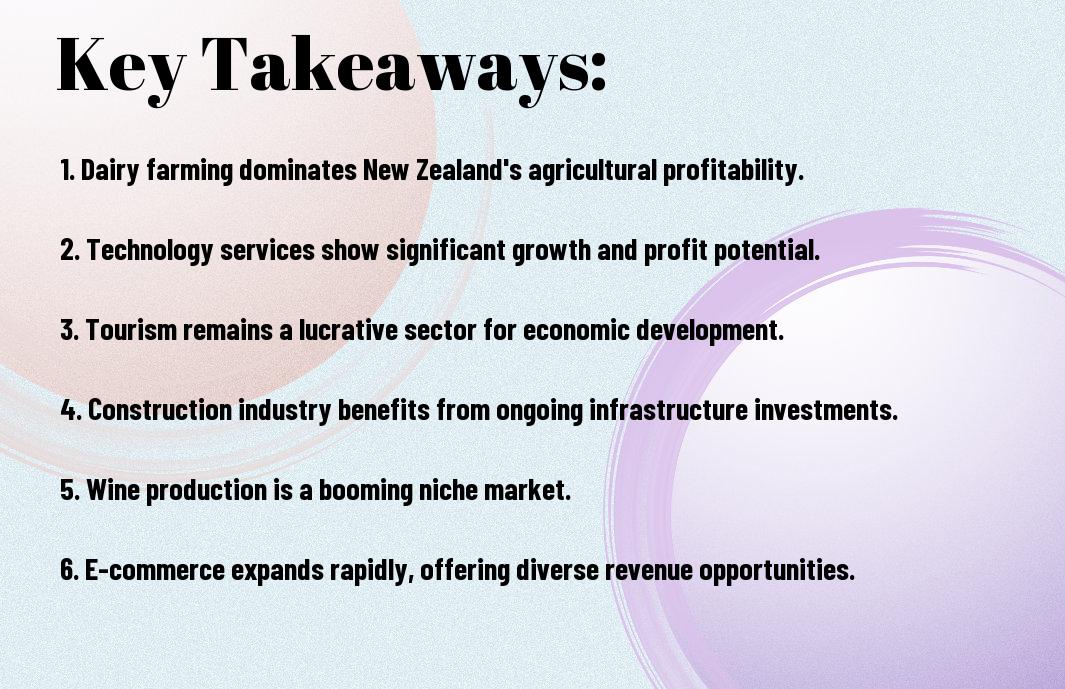Understanding which business ventures yield the highest profits in New Zealand’s economy can significantly influence your investment choices. Various industries, from agriculture to technology, present lucrative opportunities tailored to your strengths and resources. This post will guide you through the most profitable business options in New Zealand, helping you make well-informed decisions for your entrepreneurial journey.

Key Takeaways:
- Tourism Sector: New Zealand’s stunning landscapes and unique attractions make tourism one of the most lucrative businesses.
- Agriculture and Dairy Farming: The country is renowned for its high-quality dairy products, financially rewarding this sector.
- Technology and Startups: The growing tech scene in cities like Auckland creates new profitable innovation and software development opportunities.
- Real Estate Investment: With increasing demand for housing, property investment remains highly profitable.
- Specialty Food and Beverage: Businesses in this niche have seen significant profitability by capitalising on local produce and unique flavours.

Overview of the New Zealand Business Landscape
The New Zealand business landscape is diverse and dynamic, offering ample opportunities for entrepreneurs and established companies. With a strong focus on innovation, sustainability, and a supportive regulatory environment, you’ll find it an attractive location for business development. The economy is characterized by its resilience and adaptability, making it ripe for growth in various sectors.
Economic Climate
New Zealand’s economic climate remains positive, driven by a combination of strong domestic consumption and a robust export market. Low unemployment rates and manageable inflation levels contribute to a stable business environment, making it an opportune time for you to engage in new ventures or expand existing ones.
Key Industries
Below you’ll discover that New Zealand’s economy thrives on several key industries, including agriculture, tourism, technology, and renewable energy. These sectors provide significant employment opportunities and attract investment from both local and international markets.
Further exploration into the key industries reveals that the agricultural sector, especially dairy and horticulture, plays a vital role in the economy, contributing significantly to exports. Thanks to the country’s stunning landscapes and vibrant culture, tourism remains a powerhouse. The technology sector is rapidly evolving, with startups and established companies innovating and creating solutions for global challenges. At the same time, renewable energy initiatives aim to position New Zealand as a leader in sustainability. Engaging in any of these industries could lead your business toward profitability.
Top Profitable Sectors in New Zealand
Some of the most profitable sectors in New Zealand include agriculture, tourism, and technology. These industries contribute significantly to the economy and offer numerous opportunities for entrepreneurs looking to establish or expand their businesses. Understanding which thriving sectors can help you decide where to invest your resources for maximum returns.
Agriculture and Agribusiness
Profitable agriculture and agribusiness ventures are the backbone of New Zealand’s economy, with the sector producing high-quality exports, including dairy, meat, and horticultural products. The country’s unique climate and rich soil create ideal conditions for a diverse range of agricultural activities, allowing you to tap into local and international markets for sustainable growth.
Tourism and Hospitality
Sectors like tourism and hospitality leverage New Zealand’s breathtaking landscapes and rich culture, attracting millions of visitors each year. This industry presents numerous opportunities to develop businesses in accommodation, travel services, and food and beverage sectors, making it a lucrative option for entrepreneurs.
It’s important to note that tourism and hospitality not only contribute substantially to New Zealand’s GDP but also create jobs and stimulate local economies. With the increasing trend of experiential travel, you can curate unique offerings that cater to diverse tourist interests, from adventure tourism to eco-friendly accommodations, ensuring your business stands out in a competitive market.
Emerging Trends Influencing Profitability
Now, as you navigate the landscape of business opportunities in New Zealand, it’s essential to recognise the emerging trends that could significantly impact your profitability. Understanding these trends enables you to adapt your strategies and capitalize on new market demands, ensuring your business remains competitive in this evolving economy.
Technology and Innovation
To harness the power of technology and innovation, integrate advanced solutions that streamline your operations and enhance customer experience. Embracing digital tools boosts efficiency, opens up new revenue streams, and attracts tech-savvy consumers, positioning your business for sustainable growth.
Sustainability Practices
Below, adopting sustainability practices can enhance your brand reputation while attracting a growing clientele that values environmentally friendly solutions. By implementing green initiatives and responsible sourcing, you align your business with consumer expectations, setting the stage for long-term profitability.
At the core of sustainability practices is the opportunity to reduce costs and increase operational efficiency. By investing in renewable resources and minimizing waste, you not only lower your expenses but also appeal to a market increasingly focused on ethical consumption. Engaging in corporate social responsibility initiatives can further strengthen your brand loyalty, encouraging customers to choose your business for its commitment to a sustainable future.
Case Studies of Successful New Zealand Businesses
All of these businesses have demonstrated exceptional growth and profitability in New Zealand’s dynamic market:
- Hallenstein Glasson: $170 million in revenue, dominating the retail apparel sector.
- Fisher & Paykel Healthcare: $1.2 billion in sales, a global medical device leader.
- Xero: $1 billion market cap, revolutionizing accounting software for small businesses.
- Air New Zealand: $5.8 billion in revenue, recognized for innovative customer service and sustainability practices.
- SkyCity Entertainment: $1.2 billion revenue, leading in the gaming and entertainment industry.
High-Performing Startups
At the forefront of New Zealand’s economy are high-performing startups making significant impacts in various sectors. Companies like Rocket Lab, specializing in aerospace technology, have raised over $300 million in funding and are expanding globally. Another notable example is Timely, which provides innovative time-tracking software and has seen growth exceeding 400% in the past year. These startups contribute to job creation and embody the spirit of innovation driving New Zealand’s economy forward.
Established Enterprises
Along with startups, established enterprises play a vital role in New Zealand’s economic landscape. Companies like Fonterra, the world’s largest dairy exporter, have consistently reported revenues exceeding $19 billion, showcasing their global reach and production capabilities. Other prominent enterprises, like the Warehouse Group, have continued to adapt to changing consumer preferences, maintaining strong market positions and revenues that reflect their solid business strategies.
Established businesses in New Zealand leverage their years of experience to maintain competitive advantages. They often have well-defined operational frameworks, vast customer bases, and established brand identities. For instance, Z Energy has dominated the fuel retail market and branched into renewable energy initiatives, anticipating future trends. This adaptability highlights how these enterprises can thrive while fostering sustainable practices, proving that longevity and innovation can go hand in hand.
Challenges Faced by Businesses in New Zealand
After exploring potential business opportunities, it’s essential to understand the challenges that may arise in New Zealand. High operational costs, maintaining a skilled workforce, and adapting to evolving consumer preferences can impact your business’s profitability. Additionally, navigating the complexities of the local market and maintaining competitiveness requires strategic planning and ongoing effort.
Regulatory Environment
Below are several regulatory hurdles that you might encounter in New Zealand. Businesses must comply with various local and national regulations, which can involve cumbersome processes and costly requirements. Keeping up with changes in tax policies, labor laws, and environmental rules often necessitates professional advice, which can add to your operational expenses.
Market Competition
Zealand’s market is characterized by significant competition across multiple sectors. As you venture into the New Zealand business landscape, you’ll find both established companies and emerging startups vying for market share. This competitive environment might require you to differentiate your offerings, employ innovative marketing strategies, and constantly analyze competitor performance to stay relevant.
This competitive landscape makes it imperative for you to be vigilant and proactive. Understanding your competitors’ strengths and weaknesses will help you identify gaps in the market. By continuously innovating and enhancing your products or services, you can create unique value propositions to attract customers. Networking, attending industry events, and leveraging digital marketing can bolster your competitive edge in New Zealand’s dynamic business environment.
Financial Metrics and Indicators
Monitor key financial metrics and indicators to assess profitability in New Zealand’s business landscape. You’ll want to measure profit margins, return on investment, and revenue growth, as these figures indicate how well a business is performing and help make informed strategic decisions. Understanding these metrics will empower you to identify the most lucrative opportunities in your chosen sector.
Profit Margins by Sector
By analyzing profit margins by sector, you can identify which industries yield the highest returns. Technology and finance sectors typically tend to have more significant profit margins than retail or agriculture. Recognizing these differences will help you decide which business to invest your time and resources in.
Growth Projections
When assessing growth projections, you’ll find that specific sectors in New Zealand show a potential for significant expansion. Industries such as renewable energy and tech services are expected to grow faster than traditional sectors. Understanding these trends is vital to position your business or investments wisely.
Another factor to consider when looking at growth projections is the influence of government policies and market trends. New Zealand’s current government is focused on sustainability, which has given rise to opportunities in green technologies and industries. As consumer preferences shift toward eco-friendly solutions, you may find that investing in these sectors aligns with societal values and promises substantial growth in the coming years.
Summing up
Conclusively, identifying the most profitable business in New Zealand depends on various factors, including market trends and individual strengths. Sectors such as tourism, agriculture, and technology consistently show high profitability. You can tap into lucrative opportunities if you leverage your skills and interests in these areas. Conducting thorough market research and adapting to consumer needs will help you maximize your business potential in this vibrant economy.
FAQ
Q: What is the most profitable business in New Zealand?
A: The most profitable business in New Zealand often varies depending on market changes and economic conditions. However, technology, agriculture, and tourism sectors frequently highlight high profitability due to New Zealand’s rich natural resources and thriving tourism industry.
Q: How does the agricultural sector contribute to profitability in New Zealand?
A: Agriculture is a significant part of New Zealand’s economy, contributing substantially to exports. The dairy and meat sectors have proven incredibly lucrative, owing to the country’s strong reputation for high-quality agricultural products. Additionally, niche markets like organic farming are also enhancing profitability.
Q: What role does technology play in New Zealand’s profitable businesses?
A: The technology sector in New Zealand has seen rapid growth, driven by innovation and a robust start-up culture. Software development, fintech solutions, and e-commerce platforms are among the areas that offer high profit margins as businesses increasingly adopt digital solutions to optimize their operations and reach global markets.
Q: Are there specific New Zealand industries with higher profit margins than others?
A: Yes, sectors such as information technology, healthcare, and niche manufacturing tend to have higher profit margins. The pharmaceutical and biotechnology industries are also growing due to increasing demands for innovative solutions and healthcare services, making them profitable ventures.
Q: What factors should entrepreneurs consider when starting a profitable business in New Zealand?
A: When starting a business, entrepreneurs should consider market demand, competitive landscape, and regulatory requirements. Conducting thorough market research to understand consumer needs and leveraging New Zealand’s unique resources and skills can significantly impact profitability. Assessing access to funding and support from government initiatives encouraging business development is vital.


